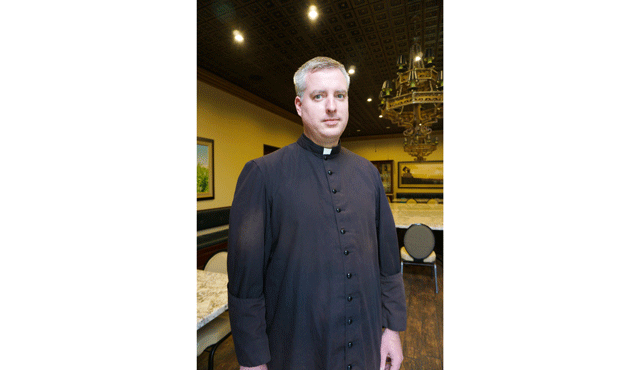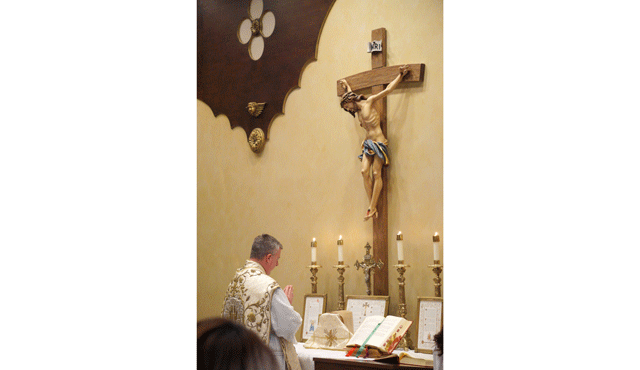Father Andrew Bartus is a member of the expanding ordinariate of pastors in Southern California and Orange County. But there is nothing ordinary about the 36-year-old priest.
He is married, has four children and a day job as a history teacher at St. Michael’s Preparatory School in Silverado. And he is a full-fledged Catholic priest.
Fr. Bartus is part of a unique group of former Anglican and Protestant priests that are in The Personal Ordinariate of the Chair of Saint Peter.
The ordinariate is a jurisdiction within the Catholic Church, much like a diocese, and created by the Vatican in 2012 for people in the Anglican tradition, who wish to become Catholics. Parishes and communities in the ordinariate are fully Roman Catholic, but retain elements of Anglican traditions and liturgy.
Unlike former efforts to absorb the tide of Anglicans returning to the Catholicism, the ordinariate provides the new parishes and clerics with their own bishop and organizational body.
As a member of the ordinariate, Fr. Bartus is not part of the Orange County Diocese, although he interacts frequently with the Diocese. Instead, his group is spread across the U.S. and Canada. The ordinariate is based in Houston and its Bishop is Steven J. Lopes.
The Canada and United States ordinariate include 41 parishes, with 69 priests, 14 permanent and transitional deacons, 11 candidates for priesthood and five seminarians.
Fr. Bartus, who previously had been an Anglican priest at St. Mary of the Angels in Los Feliz, said after the creation of the ordinariate, “I was the first priest in California ordained.”
In his conversion, Fr. Bartus, who had graduated from Anglican seminary, was allowed to retain his priesthood and received dispensation from Rome to remain married and an exemption from clerical celibacy.
Fr. Bartus said the education he received in seminary was about “90 percent” similar to Catholic teachings, but with more English history and liturgy. The Anglican priests who joined the ordinariate spent about a year learning Roman Catholic canon law.
Whether he would have kept his priesthood, Fr. Bartus said he was fully committed to converting to “the church Christ formed.”
“It wasn’t just an option or a nice thing to have,” he said.
The journey from the Anglican Communion to Catholicism was a long, soul-searching journey that thousands have taken over the years. Fr. Bartus also brought over about 54 converts from his parish and others in Orange County.
Fr. Bartus said he was guided by the spiritual journey of John Henry Newman, a 19th-century theologian and poet in England, who was an Anglican priest that left the Church of England and became a Catholic priest and cardinal.
Born in schism, after Henry VIII split with the Pope, Anglicanism has been a communion often in flux and strife. And ever since the reformation, the Catholic Church has welcomed and made overtures to Protestants to return.
In the past half-century, beginning with the ordination of women to the clergy and later decisions critics say have strayed from doctrine, the Anglican Church has endured numerous internal splits. The Episcopalian Church, the U.S. arm of Anglicanism, in 2004 became the first mainstream Christian Church to ordain an openly gay bishop and has since blessed gay unions and marriages. In recent years, a gay Canadian bishop was ordained and married his same-sex partner.
Such actions have led many Anglican parishes and groups in the U.S. to leave the Episcopal Church and seek communion with other international Anglican dioceses.
For some, like Fr. Bartus, it became too much and led him to question the true nature and meaning of the Church.
“Every time something weird happens, it splinters Anglican groups,” he said. “It just poisons the well. You become inward-looking, rather than outward.”
The Personal Ordinariate of the Chair of St. Peter was a way for Catholics to welcome Anglicans into the fold, though not the first or only. In 1980, in the wake of Pope John Paul II’s Pastoral Provision to allow Anglicans and Episcopalians to join the Catholic Church, an Anglican Use liturgy was formed and authorized.
Fr. Bartus is the administrator of Blessed John Henry Newman Catholic Church, in the Queen of Life Chapel at the Busch Irvine, law firm in Irvine, as well as other fledgling parishes he seeks to grow.
Coincidentally, Fr. Jack Barker, who assists Fr. Bartus at Newman, is also a converted former Anglican priest. The retired priest was among the first Anglican priests to be ordained when Anglican Use began, prior to the creation of the ordinariate.
While Fr. Bartus is extremely grateful to the law firm for allowing use of its facility, he is in the process of looking for an independent home church for his congregants.
In the interim, however, he says he has found his permanent spiritual home, and is happy to be able to retain his faith roots.
As he said after joining the ordinariate, “We all treasure the best of our former Anglican/Episcopalian parishes … and we don’t forget who we are and where we’ve come from.”


